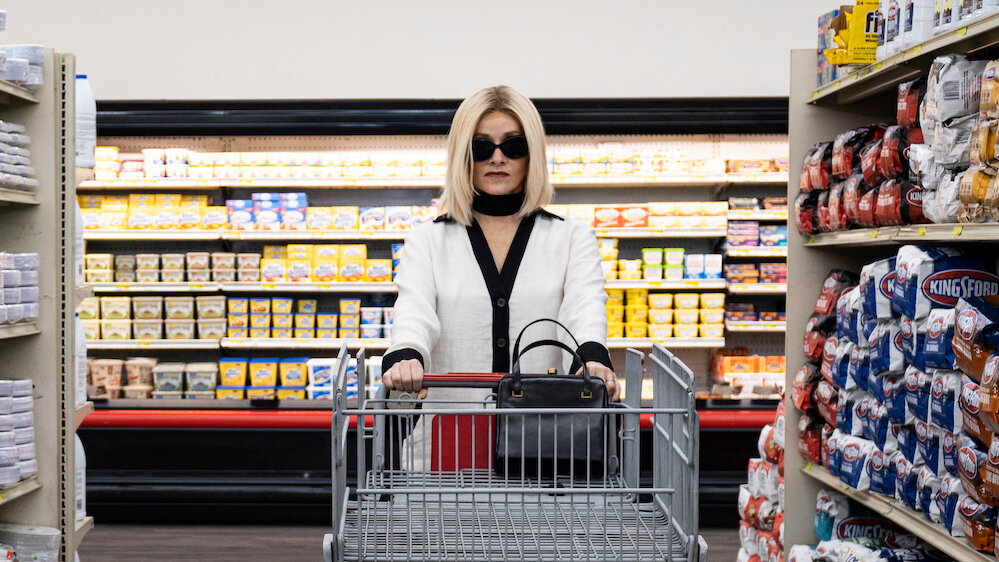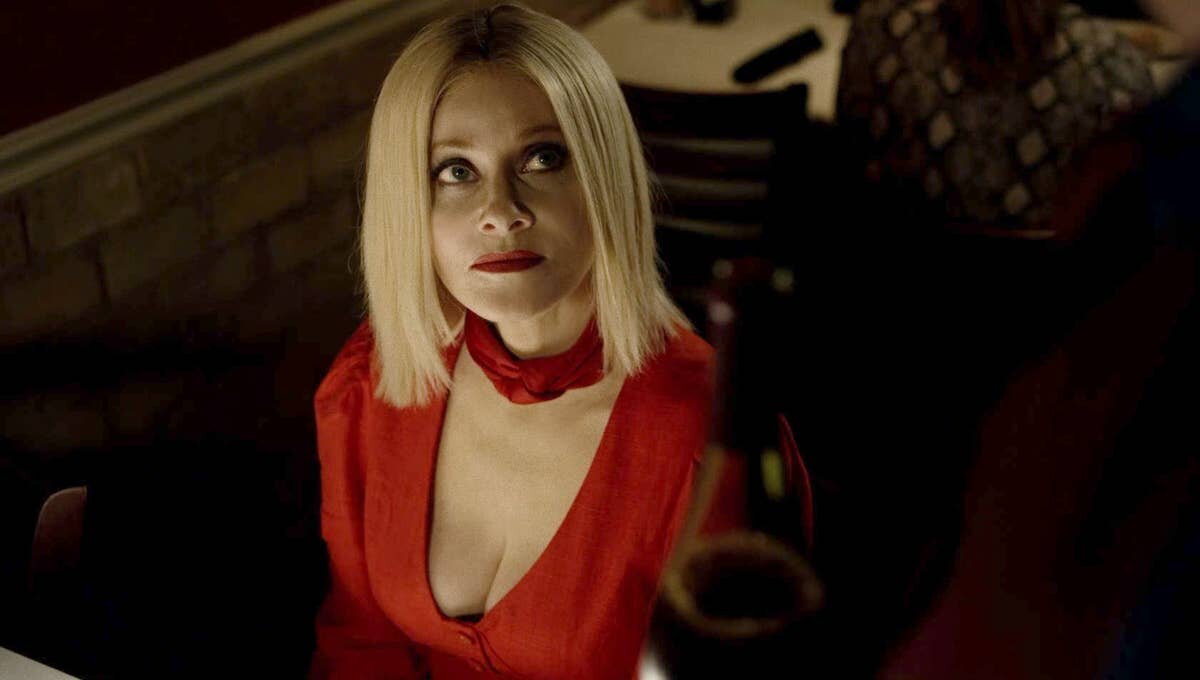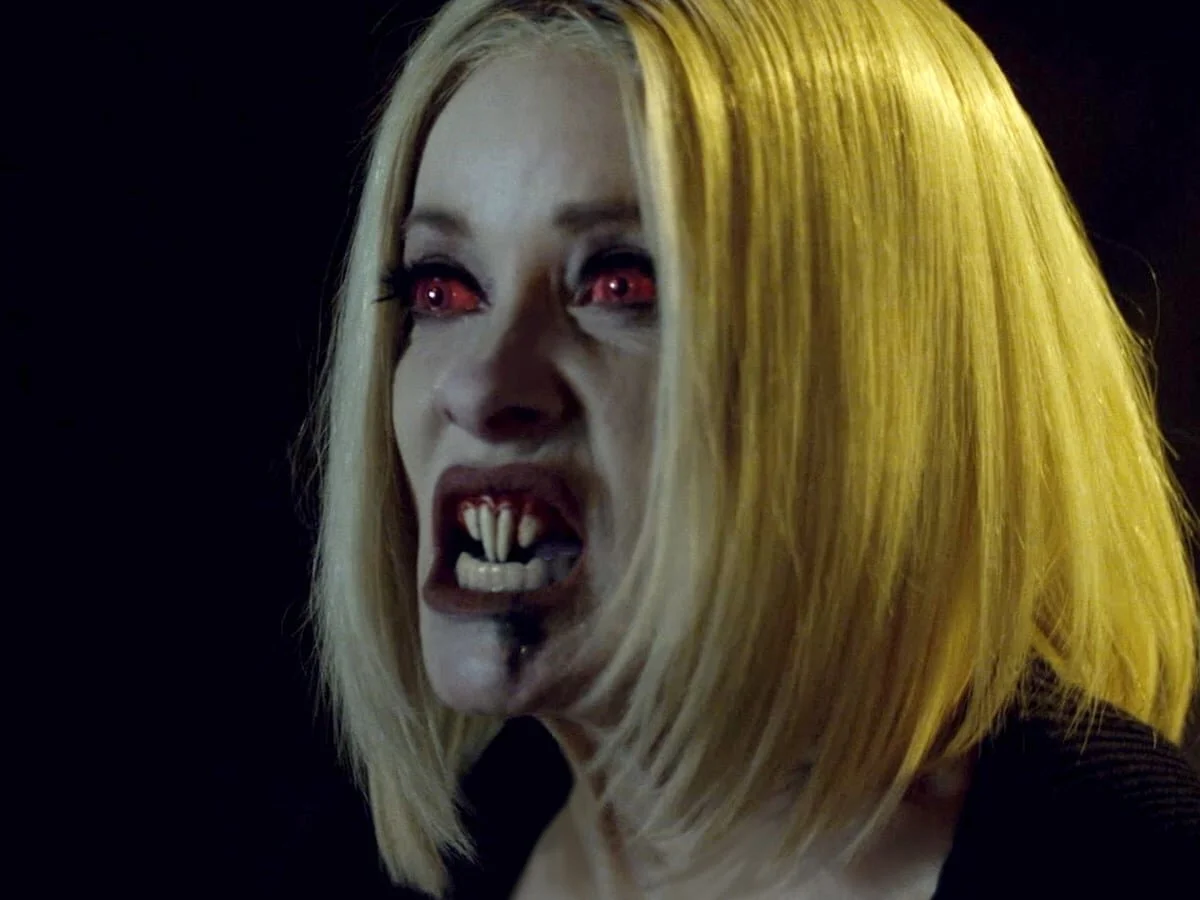[Film Review] Jakob’s Wife (2021)

Anne Fedder (Barbara Crampton) simmers in a pew, quietly disdainful of her husband. When Reverend Jakob Fedder (Larry Fessenden) proselytizes, “He who loves his wife loves himself,” it reeks of hypocrisy. In private, Jakob speaks over Anne. His snores keep her awake at night. She’s been making his breakfast for decades without gratitude. So when one of Jakob’s parish attendees Amelia (Nyisha Bell) goes missing and an old flame returns to town, Anne is ready to take a bite out of life. Only, she can’t go through with it. She needs a little help from a watchful vampire who sympathizes. Bloodthirsty and more alive than ever, Anne discovers that she adores her new sense of self. Meanwhile, locals continue to be mysteriously picked off and Anne must decide with whom her loyalties lie: her husband or her new vampiric master.
Jakob’s Wife is a film many years in the making, one that producer and star Barbara Crampton fought hard for. But you could say it started even earlier. Crampton had been largely absent from film for many years; by the mid-1990s, her acting opportunities dwindled and then after her marriage, Crampton set aside acting to focus on raising her children. In 2011, the cult horror hit You’re Next revitalized her career. She has since rededicated herself to the genre. It’s hard not to read Crampton into Anne’s story: as Anne explains, “You make plans for things and then life happens, I guess.” But, like with the film’s heroine, Crampton’s second life in horror is a remarkable one that looks forward as much as it utilizes the best of the past. While its showcase of horror icons from its stars to Bonnie Aarons (The Nun, The Conjuring 2) and Robert Rusler (A Nightmare on Elm Street 2, Vamp), bold sexuality, and spectacular moments of gore call back to the low-budget glory days of the 1980s, its feminist thrust elevates Jakob’s Wife beyond a nostalgic rendezvous.

The sermon that opens the film—Jakob’s recitation of Ephesians, which demands that husbands love their wives “that he might sanctify her” to “present the church to himself in splendor, without spot or wrinkle or any such thing. That she might be holy and without blemish”—establishes the world in which Anne lives. God creates woman. Woman brings sin to the world. Man cleanses woman of sin. You don’t have to attend Sunday School to get the message; it’s pervasive within Western culture. Though Jakob’s hypocrisy is undeniable ("You don't know how to fight for me because you've never done it!” accuses Anne), it is also clear that he views Anne as a reflection of himself and his duties as a husband. His failure to protect Anne manifests as his insistence that she should be ashamed of herself. “You had sin in your heart,” he says to her, “and you brought this on yourself.”
Jakob’s Wife, however, refrains from a trite regurgitation of the battle of the sexes. While its criticism of patriarchy on both institutional and personal levels cannot be missed, the film’s success lies in its ability to hold its negotiations in play. Anne and Jakob maintain fundamentally different viewpoints, but they also genuinely love each other. The fraught space Anne finds herself in is exacerbated by the film’s refrain, “Who are you? What do you want?”

Bonnie Aarons’s delicious portrayal of the Nosferatu-esque Master strikes the film’s feminism home. In a stunning moment, the Master asks Anne, “Were you ever really you?” The film’s ultimate conviction that Anne must decide for herself what she wants from life cannot be reduced to choosing sides: it’s not about her husband or the Master; it’s about Anne and her choices. Jakob’s Wife doesn’t shy away from the gruesome or taboo either despite its framework as a marriage drama. Rats follow the Master like the Pied Piper, recalling some of the earliest and most grotesque depictions of the vampire. And when Anne fingers the holes in her neck and masturbates at her window, the film demands that its viewers acknowledge her sexuality. It’s not often that a woman of Anne’s age is given the freedom to reinvent herself on screen; it’s even less common in vampire flicks whose stars are often teens and twenty-somethings. In Jakob’s Wife, female self-discovery can come at any time. It’s as delightful and charged as in one’s youth. The film’s take on the vampire is at once fresh and reflective, persuasive while resisting easy answers—and it’s bloody good fun.
You can watch and read Marisa’s exclusive interview with none other than Barbara Crampton herself too!


RELATED ARTICLES
When V/H/S first hit our screens in 2012, nobody could have foreseen that 11 years later we’d be on our sixth instalment (excluding the two spinoffs) of the series.
When someone is in a toxic relationship, it can affect more than just their heart and mind. Their bodies can weaken or change due to the continued stress and unhappiness that comes from the toxicity.
If you can’t count on your best friend to check your teeth and hands and stand vigil with you all night to make sure you don’t wolf out, who can you count on? And so begins our story on anything but an ordinary night in 1993…
The best thing about urban legends is the delicious thrill of the forbidden. Don’t say “Bloody Mary” in the mirror three times in a dark room unless you’re brave enough to summon her. Don’t flash your headlights at a car unless you want to have them drive you to your death.
A Wounded Fawn (Travis Stevens, 2022) celebrates both art history and female rage in this surreal take on the slasher genre.
Perpetrator opens with a girl walking alone in the dark. Her hair is long and loose just begging to be yanked back and her bright clothes—a blood red coat, in fact—is a literal matador’s cape for anything that lies beyond the beam of her phone screen.
Filmed on location in Scotland, Ryan Hendrick's new thriller Mercy Falls (2023) uses soaring views of the Scottish Highlands to show that the natural world can either provide shelter or be used as a demented playground for people to hurt each other.

EXPLORE
Now it’s time for Soho’s main 2023 event, which is presented over two weekends: a live film festival at the Whirled Cinema in Brixton, London, and an online festival a week later. Both have very rich and varied programmes (with no overlap this year), with something for every horror fan.
In the six years since its release the Nintendo Switch has amassed an extensive catalogue of games, with everything from puzzle platformer games to cute farming sims to, uh, whatever Waifu Uncovered is.
A Quiet Place (2018) opens 89 days after a race of extremely sound-sensitive creatures show up on Earth, perhaps from an exterritorial source. If you make any noise, even the slightest sound, you’re likely to be pounced upon by these extremely strong and staggeringly fast creatures and suffer a brutal death.
If you like cults, sacrificial parties, and lesbian undertones then Mona Awad’s Bunny is the book for you. Samantha, a student at a prestigious art university, feels isolated from her cliquey classmates, ‘the bunnies’.
The slasher sub genre has always been huge in the world of horror, but after the ‘70s and ‘80s introduced classic characters like Freddy Krueger, Michael Myers, Leatherface, and Jason, it’s not harsh to say that the ‘90s was slightly lacking in the icon department.
Mother is God in the eyes of a child, and it seems God has abandoned the town of Silent Hill. Silent Hill is not a place you want to visit.
Being able to see into the future or back into the past is a superpower that a lot of us would like to have. And while it may seem cool, in horror movies it usually involves characters being sucked into terrifying situations as they try to save themselves or other people with the information they’ve gleaned in their visions.
Both the original Pet Sematary (1989) and its 2019 remake are stories about the way death and grief can affect people in different ways. And while the films centre on Louis Creed and his increasingly terrible decision-making process, there’s no doubt that the story wouldn’t pack the same punch or make the same sense without his wife, Rachel.
MORE ARTICLES
Read All Marisa’s Articles


![[Film Review] V/H/S/85 (2023)](https://images.squarespace-cdn.com/content/v1/5fe76a518d20536a3fbd7246/1697455043249-K64FG0QFAFVOMFHFSECM/MV5BMDVkYmNlNDMtNGQwMS00OThjLTlhZjctZWQ5MzFkZWQxNjY3XkEyXkFqcGdeQXVyMTUzMTg2ODkz._V1_.jpg)
![[Film Review] Kill Your Lover (2023)](https://images.squarespace-cdn.com/content/v1/5fe76a518d20536a3fbd7246/1697465940337-T55VQJWAN4CHHJMXLK32/56_PAIGE_GILMOUR_DAKOTA_HALLWAY_CONFRONTATION.png)
![[Film Review] Shaky Shivers (2022)](https://images.squarespace-cdn.com/content/v1/5fe76a518d20536a3fbd7246/1696442594997-XMJSOKZ9G63TBO8QW47O/Screenshot+2023-10-04+at+18.59.33.png)
![[Film Review] Elevator Game (2023)](https://images.squarespace-cdn.com/content/v1/5fe76a518d20536a3fbd7246/1696440997551-MEV0YZSC7A7GW4UXM5FT/Screenshot+2023-10-04+at+18.31.42.png)
![[Film Review] A Wounded Fawn (2022)](https://images.squarespace-cdn.com/content/v1/5fe76a518d20536a3fbd7246/1695484054446-7R9YKPA0L5ZBHJH4M8BL/Screenshot+2023-09-23+at+16.42.24.png)
![[Film Review] Perpetrator (2023)](https://images.squarespace-cdn.com/content/v1/5fe76a518d20536a3fbd7246/1695483561785-VT1MZOMRR7Z1HJODF6H0/Screenshot+2023-09-23+at+16.32.55.png)
![[Film Review] Mercy Falls (2023)](https://images.squarespace-cdn.com/content/v1/5fe76a518d20536a3fbd7246/1695482997293-E97CW9IABZHT2CPWAJRP/Screenshot+2023-09-23+at+16.27.27.png)





















![[Editorial] 10 Films & Events to Catch at Soho Horror Film Fest 2023](https://images.squarespace-cdn.com/content/v1/5fe76a518d20536a3fbd7246/1700819417135-299R7L4P0B676AD3RO1X/Screenshot+2023-11-24+at+09.41.52.png)
![[Editorial] 9 Horror Nintendo Switch Games To Play](https://images.squarespace-cdn.com/content/v1/5fe76a518d20536a3fbd7246/1697214470057-3XZXX8N4LYIMDFWS6Z3P/Screenshot+2023-10-13+at+17.20.13.png)
![[Mother of Fears] Mothering in Silence in A Quiet Place (2018)](https://images.squarespace-cdn.com/content/v1/5fe76a518d20536a3fbd7246/1696445921315-HZJ2DZYQIH6VVWXBO2YL/Screenshot+2023-10-04+at+19.52.29.png)
![[Editorial] 5 Female Focused Horror Book Recommendations](https://images.squarespace-cdn.com/content/v1/5fe76a518d20536a3fbd7246/1696441981361-52EQCTJ7AT2QF1927GM7/919xtm6d3fL._AC_UF894%2C1000_QL80_.jpg)
![[Editorial] 9 Best Slashers Released Within 10 Years of Scream (1996)](https://images.squarespace-cdn.com/content/v1/5fe76a518d20536a3fbd7246/1695478839037-LOFHGVM3H6BMSZW7G83M/Screenshot+2023-09-23+at+15.15.11.png)
![[Mother of Fears] Mother Vs. Monster in Silent Hill (2006)](https://images.squarespace-cdn.com/content/v1/5fe76a518d20536a3fbd7246/1695485781119-H6GNP0G3J2TLPAOIABV7/Screenshot+2023-09-23+at+17.11.56.png)
![[Editorial] 9 Terrifying Cerebral Visions in Horror Movies](https://images.squarespace-cdn.com/content/v1/5fe76a518d20536a3fbd7246/1693509801235-X23OL50T1DVGECH0ZJK2/MV5BMjQ0MTg2MjQ4MV5BMl5BanBnXkFtZTgwMTU3NDgxMTI%40._V1_.jpg)
![[Mother of Fears] I Don’t Wanna Be Buried in a Pet Sematary (1989) and (2019)](https://images.squarespace-cdn.com/content/v1/5fe76a518d20536a3fbd7246/1691328766069-QFNAVJOMFZVZ5CLU1RWM/Screenshot+2023-08-06+at+14.23.13.png)

If you know me at all, you know that I love, as many people do, the work of Nic Cage. Live by the Cage, die by the Cage. So, when the opportunity to review this came up, I jumped at it.